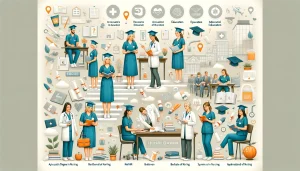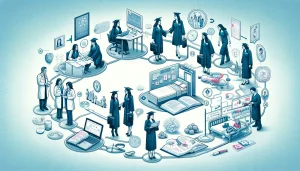Nursing stands as a venerable profession, serving as a cornerstone in healthcare provision, patient advocacy, and the promotion of well-being. Those drawn to this esteemed vocation embark on an enriching journey of education and training, aimed at equipping them with the requisite knowledge, skills, and clinical acumen essential for excellence in their roles.
However, the educational pathways available to aspiring nurses exhibit a spectrum of options, prompting inquiries into the extent of education necessary to embark on a nursing career.
In light of this, this article delves into the myriad levels of education accessible to nurses, spanning from foundational entry-level positions to specialized advanced practice specialties, while also delving into the myriad benefits associated with the pursuit of higher education within the nursing realm.
Entry-Level Education in Nursing:

1. Bachelor of Science in Nursing (BSN) Programs:
– BSN programs serve as the most common entry point into the nursing profession, offering a comprehensive education in nursing theory, clinical practice, and evidence-based care.
– Typically lasting four years, BSN programs provide students with a solid foundation in biological sciences, nursing principles, and healthcare ethics.
– Curriculum includes coursework in anatomy, physiology, pharmacology, nursing research, and patient care management, among others.
– Clinical rotations in various healthcare settings, such as hospitals, clinics, and community health centers, allow students to gain hands-on experience and apply theoretical knowledge in real-world scenarios.
2. NCLEX-RN Licensure Examination:
– Graduates of BSN programs are eligible to sit for the National Council Licensure Examination for Registered Nurses (NCLEX-RN), a standardized exam administered by state nursing boards.
– The NCLEX-RN assesses the knowledge and skills necessary to practice safely and effectively as a registered nurse (RN).
– Passing the NCLEX-RN is a prerequisite for obtaining licensure as a registered nurse, allowing graduates to practice nursing legally within their state of licensure.
– BSN graduates must demonstrate proficiency in areas such as nursing assessment, medication administration, patient education, and ethical decision-making to pass the NCLEX-RN exam and become licensed as RNs.
Read Here: what is steam education and why is it important
3. Benefits of BSN Education:
– BSN-educated nurses are equipped with a higher level of education and training, enabling them to provide quality patient care, engage in evidence-based practice, and assume leadership roles within healthcare organizations.
– Employers increasingly prefer hiring BSN-educated nurses due to their comprehensive education, critical thinking skills, and proficiency in nursing practice.
– BSN-prepared nurses are better positioned to adapt to the evolving healthcare landscape, navigate complex healthcare systems, and advocate for patient safety and quality outcomes.
– Advanced education in nursing enhances job satisfaction, career advancement opportunities, and earning potential for BSN graduates, making it a worthwhile investment in one’s nursing career.
Associate Degree in Nursing (ADN) Programs:
1. Pathway to Registered Nursing:
– ADN programs offer an alternative pathway to becoming a registered nurse (RN), typically requiring two to three years to complete.
– These programs focus primarily on developing clinical skills and foundational nursing competencies necessary for entry-level nursing practice.
– ADN students receive instruction in areas such as patient assessment, medication administration, nursing fundamentals, and care planning, preparing them for direct patient care roles in healthcare settings.
2. Curriculum and Coursework:
– ADN programs provide a condensed curriculum that emphasizes practical, hands-on learning experiences in clinical settings.
– Coursework covers topics such as anatomy, physiology, pharmacology, medical-surgical nursing, maternal-child health, and mental health nursing.
– Clinical rotations in hospitals, long-term care facilities, and community health settings allow ADN students to apply theoretical knowledge in real-world patient care scenarios under the supervision of experienced nurses and clinical instructors.
3. NCLEX-RN Eligibility:
– Graduates of ADN programs are eligible to sit for the National Council Licensure Examination for Registered Nurses (NCLEX-RN), just like BSN graduates.
– The NCLEX-RN assesses the knowledge and skills necessary for safe and effective nursing practice and serves as the licensure examination for RNs in the United States.
– Successful completion of the NCLEX-RN exam is required for licensure as a registered nurse, enabling ADN graduates to practice nursing legally within their state of licensure.
4. Opportunities for Further Education:
– While ADN graduates are eligible for entry-level nursing positions upon licensure as RNs, many choose to pursue further education to advance their careers and expand their professional opportunities.
– Continuing education options for ADN graduates may include pursuing a Bachelor of Science in Nursing (BSN) through an RN-to-BSN program or enrolling in advanced nursing degree programs, such as Master of Science in Nursing (MSN) or Doctor of Nursing Practice (DNP) programs.
– Further education can enhance job prospects, increase earning potential, and open doors to leadership roles, specialized nursing practice, research opportunities, and advanced practice nursing specialties.
5. Benefits and Considerations:
– ADN programs offer a more accessible and cost-effective pathway to entering the nursing profession for individuals seeking to become registered nurses.
– The shorter duration of ADN programs allows students to enter the workforce sooner and begin their nursing careers with less time spent in formal education.
– However, ADN-educated nurses may encounter limitations in career advancement and job opportunities compared to their BSN-educated counterparts, as many healthcare organizations prefer hiring BSN-prepared nurses for their higher level of education and training.
Read Here: why is physical education important
Advanced Education and Specialization in Nursing:
1. Master of Science in Nursing (MSN) Programs:
– MSN programs are designed for nurses interested in pursuing advanced practice roles or specialized areas of nursing beyond the Bachelor of Science in Nursing (BSN) level.
– These programs offer advanced coursework and clinical training in various nursing specialties, including nurse practitioner, nurse educator, nurse administrator, and nurse anesthetist.
– MSN programs typically require two to three years of full-time study and provide nurses with the advanced knowledge, skills, and competencies needed to excel in their chosen specialty.
– Curriculum may include advanced pathophysiology, pharmacology, health assessment, diagnostic reasoning, clinical decision-making, and specialized nursing interventions tailored to the chosen specialty.
2. Doctor of Nursing Practice (DNP) Programs:
– DNP programs represent the highest level of education available to nurses and are designed for those seeking leadership roles in clinical practice, healthcare administration, or academia.
– DNP programs focus on advanced clinical practice, evidence-based research, healthcare policy, and leadership development to prepare nurses for advanced practice roles, nurse executive positions, or nursing faculty positions.
– Graduates of DNP programs are equipped with the knowledge and skills necessary to lead change, improve healthcare outcomes, and advance nursing practice at the highest level.
– Curriculum may include advanced coursework in healthcare systems and policy, quality improvement, population health, informatics, leadership theory, and healthcare finance, as well as a DNP project that demonstrates the integration of evidence-based practice into clinical settings.
3. Benefits of Advanced Education:
– Advanced education and specialization in nursing open up a wide range of career opportunities and advancement options for nurses.
– Nurses with MSN or DNP degrees are qualified to assume leadership roles in clinical practice, healthcare administration, research, education, and policy development.
– Advanced practice nurses (APRNs) with MSN or DNP degrees are authorized to provide comprehensive healthcare services, including diagnosis, treatment, and management of acute and chronic conditions, under state licensure regulations.
– Advanced education enhances nurses’ clinical expertise, critical thinking skills, and evidence-based practice competencies, leading to improved patient outcomes, increased job satisfaction, and higher earning potential.
4. Considerations for Pursuing Advanced Education:
– Nurses considering advanced education should carefully evaluate their career goals, interests, and aspirations to determine the most suitable pathway for their professional development.
– Factors to consider include program accreditation, curriculum content, clinical training opportunities, faculty expertise, financial considerations, and potential for career advancement and specialization.
– Advanced education requires a significant commitment of time, effort, and resources, but the benefits of career advancement, expanded scope of practice, and professional fulfillment can make it a worthwhile investment in one’s nursing career.
Read Here: how to become a special education teacher
Benefits of Higher Education in Nursing:

1. Enhanced Patient Care:
– Nurses with advanced degrees possess a deeper understanding of nursing theory, research methodologies, and evidence-based practice, allowing them to deliver high-quality, patient-centered care.
– Advanced education equips nurses with advanced clinical skills, critical thinking abilities, and decision-making competencies, enabling them to assess complex patient needs, develop comprehensive care plans, and implement effective interventions to improve patient outcomes.
2. Leadership Development:
– Higher education in nursing prepares nurses to assume leadership roles within healthcare organizations, guiding teams, implementing best practices, and driving quality improvement initiatives.
– Advanced education enhances nurses’ leadership skills, communication abilities, and strategic thinking, enabling them to effectively manage interdisciplinary teams, advocate for patient safety, and promote organizational excellence.
3. Career Advancement Opportunities:
– Pursuing higher education in nursing opens up a wide range of career advancement opportunities, including roles in advanced practice, nursing administration, research, education, and policy development.
– Nurses with advanced degrees are well-positioned to pursue specialized nursing roles, such as nurse practitioner, clinical nurse specialist, nurse educator, nurse executive, or nurse researcher, based on their areas of interest and expertise.
4. Increased Earning Potential:
– Nurses with advanced degrees typically command higher salaries and enjoy greater earning potential compared to those with lower levels of education.
– Advanced practice nurses (APRNs), such as nurse practitioners, nurse anesthetists, nurse midwives, and clinical nurse specialists, often earn salaries at the higher end of the nursing spectrum due to their advanced education, specialized skills, and expanded scope of practice.
5. Contribution to Profession and Healthcare System:
– Higher education in nursing contributes to the ongoing advancement of the profession by fostering innovation, research, and the development of best practices.
– Nurses with advanced degrees play a vital role in shaping healthcare policy, influencing practice guidelines, and improving patient outcomes through evidence-based practice and research initiatives.
– By advancing their education, nurses contribute to addressing the complex challenges facing the healthcare system, including healthcare disparities, workforce shortages, and the need for quality improvement and patient safety initiatives.
Conclusion:
The pursuit of a nursing career entails a personalized educational path, shaped by individual goals, aspirations, and desired areas of specialization. While entry-level positions can be secured with an Associate Degree in Nursing (ADN) or a Bachelor of Science in Nursing (BSN), the decision to pursue advanced education through Master of Science in Nursing (MSN) or Doctor of Nursing Practice (DNP) programs offers an array of compelling advantages.
These include expanded career horizons, heightened earning potentials, and the acquisition of advanced clinical proficiencies. Regardless of the educational trajectory chosen, nursing remains a multifaceted and deeply rewarding profession, characterized by a commitment to continuous learning, professional growth, and the delivery of exceptional patient-centered care. It is this enduring dedication to excellence that defines the essence of nursing and underscores its indispensable role within the healthcare landscape.
